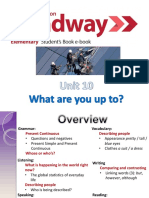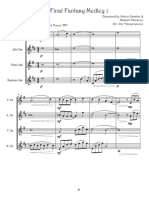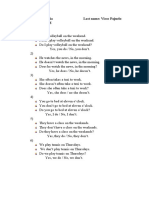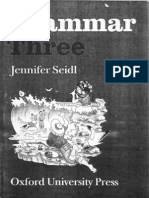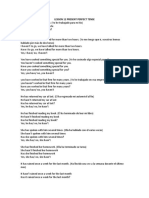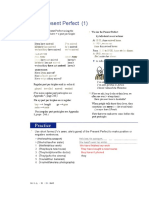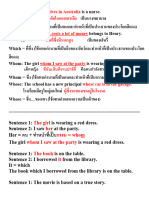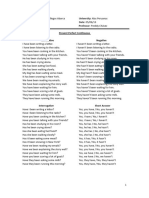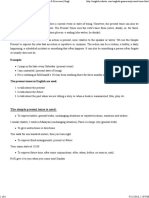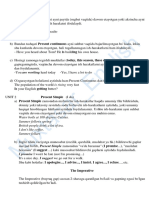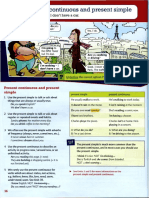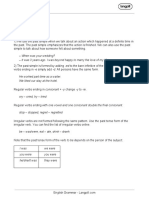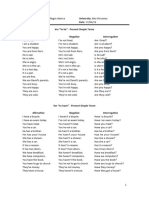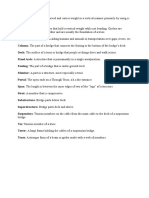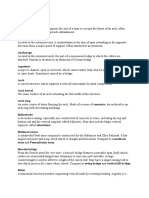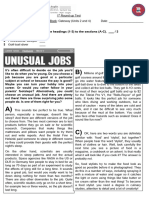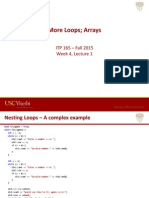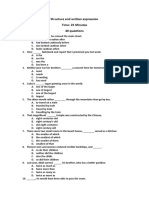12 (All) English Tenses With Examples: Present Simple
12 (All) English Tenses With Examples: Present Simple
Uploaded by
Andrea TokarovaCopyright:
Available Formats
12 (All) English Tenses With Examples: Present Simple
12 (All) English Tenses With Examples: Present Simple
Uploaded by
Andrea TokarovaOriginal Description:
Original Title
Copyright
Available Formats
Share this document
Did you find this document useful?
Is this content inappropriate?
Copyright:
Available Formats
12 (All) English Tenses With Examples: Present Simple
12 (All) English Tenses With Examples: Present Simple
Uploaded by
Andrea TokarovaCopyright:
Available Formats
12 (All) English Tenses
with Examples
Present Simple
1. Usual, regular action:
I usually go fishing at weekends. I dont go fishing at
weekends. Do I go fishing at weekends?
You always know the answer. You dont always know the
answer. Do you always know the answer?
She never puts milk in her tea. She doesnt put milk in her
tea. Does she ever put milk in her tea?
My father plays the violin. My father doesnt play the
violin. Does your father play the violin?
We sometimes go to the cinema on Friday. We dont go to the
cinema on Friday. Do we goto the cinema on Fridays?
They never walk in the wood. They dont walk in the
wood. Do they walk in the wood?
2. General existence; stating a fact:
An ostrich has two legs. A rabbit doesnt have two legs. How many
legs does a spiderhave?
The earth goes round the sun. The sun doesnt go round the
earth. Does the moon goround the earth?
Water is liquid at room temperature. Gold isnt liquid at room
temperature. Is gold solid at room temperature?
3. Dramatic narrative (theatre, sports, etc. events):
Johnson takes the ball, he bounces it to the floor, then
he throws and scores two points.
4. Timetables
The train leaves at half past four. The train doesnt leave at five.
What time does the trainleave?
The course starts on 1 July. The course doesnt start in June.
When does the coursestart?
Present Progressive (continuous)
1. Action happening now:
Im watching a film on TV now. Im not watching a
film. Am I watching a film?
Watch out, a cars coming. It isnt not coming. Is it coming?
The boys are sleeping upstairs. They boys arent
sleeping upstairs. Are the boys sleepingupstairs?
2. Action happening about this time, but not necessarily now:
Hes studying Spanish and German. Hes not studying French.
What languages is hestudying?
Theyre going to a business course. They arent going to a cooking
course. What course arethey going to?
Youre visiting museums while youre here. Youre not
visiting factories. Are you visitingmuseums in our city?
3. Definite arrangement in the near future:
Im travelling to Paris tomorrow. Im not travelling to Paris
tomorrow. Am I travelling to Paris tomorrow?
My son is taking his girlfriend to dinner tonight. My son isnt
taking his girlfriend to dinner tonight. Is he taking his girlfriend to
dinner tonight?
Youre going to Italy on holiday this year, arent you? You arent
going to Greece. Whereare you going on holiday this year?
Past Simple
Actions, events in the past:
I had lunch with Mrs Robinson yesterday. I didnt have lunch with
Mrs Robinson yesterday. Did I have lunch with Mrs Robinson
yesterday?
Mother went to work on Tuesday. Mother didnt go to work on
Tuesday. Did Mother go to work on Tuesday?
You did the shopping this morning. You didnt do the shopping this
morning. Where didyou do the shopping this morning?
She travelled to Spain last year. She didnt travel anywhere last
year. Where did she travellast year?
Past Progressive
Action in progress in the past:
I was working in the garden when my sister arrived. I wasnt
working in the garden when my sister arrived. Was I working in the
garden when my sister arrived?
We were watching a film at ten last night. We werent watching a
film at ten last night.Were we watching film at ten last night?
She was playing with the kids from eight to nine. She wasnt
playing with the kids from eight to nine. Who was she playing with?
Present Perfect Simple
1. Action with a result:
Sorry, Ive parked at the wrong place. I havent parked at the wrong
place. Have I parkedat the wrong place?
Youve (already) printed the letters. You havent printed the letters
(yet). Have you printedthe letters (yet)?
Weve (already) done the rooms. We havent done the rooms
yet. Have we done the rooms (yet)?
He has already repaired the lawn-mower. He hasnt repaired the
lawn-mower yet. Has herepaired the lawn-mower yet?
2. Action in incomplete time:
Our friends have visited us four times this summer. Our
friends havent visited us this summer. How many times have our
friends visited us this summer?
Ive been to the cinema a lot lately. I havent been to the cinema
lately. Have I been to the cinema lately?
Youve been on holiday this year. You havent been on holiday this
year. Have you been on holiday this year?
3. Action in the past without saying when:
Jane has already been to Italy. Jane has never been to
Italy. Has Jane ever been to Italy?
You have already swum in this lake. You havent swum in this lake
yet. Have you everswum in this lake?
Youve been to the hairdressers. You havent been to the
hairdressers. Where have youbeen?
4. Action beginning in the past and still continuing:
The Simpsons have lived here for eight years. The
Simpsons havent lived here for long. How long have the
Simpsons lived here?
He has driven a car since 2002. He hasnt driven a car since
2002. Has he driven a car since 2002?
Youve worked here for two years. You havent worked here for two
years. How long haveyou worked here?
Present Perfect Progressive
Action beginning in the past and still continuing (with the progress
emphasized):
Theyve been staying in this hotel for ten days. They havent been
staying in this hotel for ten days. Have they been staying in this hotel
for ten days?
He has been mowing the lawn all this morning. He hasnt been
mowing the lawn all this morning. How long has he been mowing the
lawn?
Youve been missing classes lately. You havent been coming to
class lately. What have youbeen doing lately?
Past Perfect Simple
Action in the past before another:
She said she had written three letters the day before. She said
she hadnt written any letters the day before. How many
letters had she written the day before?
They had lived in York before they moved to Liverpool. They hadnt
lived in York before they moved to Liverpool.
Where had they lived before they moved to Liverpool?
Youd locked the door before you left. You hadnt locked the door
before you left. Had youlocked the door before you left?
Past Perfect Progressive
Action in the past before another (with the progress emphasized):
He said he had been mowing the lawn all that morning. He said he
hadnt been mowing the lawn all that morning. How long had he been
moving the lawn when you met him?
They had been working for the same company for a long time
before they changed jobs. They hadnt been working for the same
company for a long time before they changed jobs. Had they
been working for the same company for a long time before they
changed jobs?
They had been living in York before they moved to Liverpool. They
hadnt been living in York before they moved to Liverpool. How
long had they been living in York before they moved to Liverpool?
Future Simple
Fact, action or event in the future:
I will be thirty years old next year. I wont be thirty years old
again. Will I be thirty years old again?
Well meet them at the station at six. We wont meet them at the
station. Where will wemeet them?
Youll cross the channel by ferry. You wont cross the channel.
How will you cross the channel?
Future Progressive
Action in progress at a given time of the future:
This time tomorrow we will be flying to Los Angeles. We wont be
flying to New York. Wherewill we be flying?
Youll be doing housework with me at six tomorrow. You wont be
playing football. Whatwill you be doing at six tomorrow?
Ill be playing tennis from seven to nine. I wont be playing tennis at
six. When will I be playing tennis?
Future Perfect Simple
Action completed by a given time of the future:
I will have done this work by the end of next week. I wont have
done this work by the end of next week. Will I have done this work by
the end of next week?
Theyll have arrived by the time we return. They wont have
arrived by the time we return.Will they have arrived by the time we
return?
She will have taken three exams by next Tuesday. She wont have
taken any exams by next Tuesday. How many exams will she have
taken by next Tuesday?
Future Perfect Progressive
Action completed by or still in progress at a given time of the future
(with the progress emphasized):
We will have been staying here for a week tomorrow. We wont
have been staying here for a week tomorrow. How long will we have
been staying here?
You will have been living here for thirty years by this time next
year. You wont have been living here for thirty years by this time
next year How long will you have been living here by this time next
year?
Ill have been playing the guitar for ten years by next year. I wont
have been playing the guitar for ten years by next year. How
long will I have been playing the guitar?
You might also like
- 9A Subiect +barem Olimpiada EnglezaDocument7 pages9A Subiect +barem Olimpiada EnglezaCristina67% (3)
- FCE Speaking Part 2Document3 pagesFCE Speaking Part 2Andrea Tokarova100% (5)
- Headway Elementary Unit 10Document65 pagesHeadway Elementary Unit 10Công-65XD13 Phương Hữu100% (3)
- Reported Speech 30-04-2021Document147 pagesReported Speech 30-04-2021Lexander AgamaNo ratings yet
- Gs Future Forms - Exercises Mile.Document2 pagesGs Future Forms - Exercises Mile.Ana Milena Ruiz Acosta100% (2)
- FF Sax QuartetDocument31 pagesFF Sax QuartetTranscription TempleNo ratings yet
- EgyptianDocument292 pagesEgyptianoprmar100% (7)
- 12 Tenses and ExplanationDocument20 pages12 Tenses and Explanationkiransdb100% (1)
- Simple Present: (VERB) + S/es in III PersonDocument11 pagesSimple Present: (VERB) + S/es in III PersonRobbyRobertNo ratings yet
- English Work Present Simple and Present ProgressiveDocument3 pagesEnglish Work Present Simple and Present Progressiveyrene vicos pajueloNo ratings yet
- Grammar 3Document126 pagesGrammar 3rodo25No ratings yet
- 000044Document126 pages000044Pauli De La MazaNo ratings yet
- English Tenses, CzechDocument9 pagesEnglish Tenses, CzechElaurienNo ratings yet
- Simple Future ReviewDocument22 pagesSimple Future ReviewTânia CarmonarioNo ratings yet
- Английски език - Образуване на глаголните времена. Неправилни глаголиDocument81 pagesАнглийски език - Образуване на глаголните времена. Неправилни глаголиХристина ДолапчиеваNo ratings yet
- Lesson 12 Present Perfect TenseDocument8 pagesLesson 12 Present Perfect TenseOscar Raul ZLNo ratings yet
- All 12 TensesDocument19 pagesAll 12 TensesJojo LeaonNo ratings yet
- Reported Speech 30-04-2021Document145 pagesReported Speech 30-04-2021Lexander AgamaNo ratings yet
- TALLERnPRESENTnPERFECTnREALIZADOn1 5760ca88564effaDocument6 pagesTALLERnPRESENTnPERFECTnREALIZADOn1 5760ca88564effaYULY BUITRAGONo ratings yet
- Unit 1 Exercises: 1 Is The Verb in Bold An Auxiliary Verb (A) or A Full Verb (F) ?Document5 pagesUnit 1 Exercises: 1 Is The Verb in Bold An Auxiliary Verb (A) or A Full Verb (F) ?Ralica CvetanovaNo ratings yet
- Transformations - CPE Use of English - Units 1-5Document30 pagesTransformations - CPE Use of English - Units 1-5oskarrrr2005No ratings yet
- Be Going To 91604Document53 pagesBe Going To 91604DAO NANCYNo ratings yet
- ActiveDocument7 pagesActiveJalaludin JambeiNo ratings yet
- Who Lives in Australia: Who: My Friend Is A NurseDocument26 pagesWho Lives in Australia: Who: My Friend Is A Nurseครูปัณณภัสร์ สวัสดิ์ภัสร์No ratings yet
- 3 Past Tenses 02Document10 pages3 Past Tenses 02adminNo ratings yet
- Tenses - Semester 1Document22 pagesTenses - Semester 1nada.chbikiNo ratings yet
- Completo FuturoDocument28 pagesCompleto Futurocactus1983No ratings yet
- Tenses CorrectionDocument29 pagesTenses Correctionapi-271650264100% (1)
- Cartilla 2 Grammar1Document100 pagesCartilla 2 Grammar1Magali SalinasNo ratings yet
- - قل ولا تقل بالانجليزية Hany128Document15 pages- قل ولا تقل بالانجليزية Hany128Krotin DechEvreNo ratings yet
- All About Present & Past TensesDocument4 pagesAll About Present & Past TensesONG YIET FONG MoeNo ratings yet
- Lesson 2Document10 pagesLesson 2chuanjin shenNo ratings yet
- The Simple Present TenseDocument21 pagesThe Simple Present TenseHamza djioui - حمزة ادجيويNo ratings yet
- Tarea Inglés 3Document4 pagesTarea Inglés 3angelagallegosabNo ratings yet
- Week 12 - Adverbial PhrasesDocument7 pagesWeek 12 - Adverbial PhrasesAngel DiosNo ratings yet
- აწმყო სრული დრო How to form the present perfectDocument5 pagesაწმყო სრული დრო How to form the present perfectDimitriNo ratings yet
- Cátedra de Inglés - Estructuras VerbalesDocument5 pagesCátedra de Inglés - Estructuras Verbalesikay.07.aragonNo ratings yet
- Ingles 5Document79 pagesIngles 5ginox1No ratings yet
- 2 Slides Curso de Ingles Intermedio b1 Verbos Causativos y Voz PasivaDocument174 pages2 Slides Curso de Ingles Intermedio b1 Verbos Causativos y Voz PasivajassonNo ratings yet
- Present Tense - Types of Present Tense, Examples & ExercisesDocument6 pagesPresent Tense - Types of Present Tense, Examples & ExercisesDard TongNo ratings yet
- viết 123Document9 pagesviết 123Nhat Truong BuiNo ratings yet
- Weak Form 2Document3 pagesWeak Form 2Ha PhuongNo ratings yet
- B1 English Grammar Lexis Morphology CawthraDocument85 pagesB1 English Grammar Lexis Morphology CawthraJonathan Azaña Ramos100% (1)
- New Headway Intermediate Additional Exercises - Prof. Galo Proano. 2014 BDocument18 pagesNew Headway Intermediate Additional Exercises - Prof. Galo Proano. 2014 BDoraNickoleVGNo ratings yet
- Tenses 4Document42 pagesTenses 4Angelica PocitariNo ratings yet
- Present Simple Present ContinuousDocument2 pagesPresent Simple Present Continuous4w6cszvpdcNo ratings yet
- Homework - Activity 1 2 3Document3 pagesHomework - Activity 1 2 3Cristhian H. Salazar SalazarNo ratings yet
- Present Simple# CountinuousDocument20 pagesPresent Simple# CountinuousHelen KryklyvaNo ratings yet
- English GrammarDocument19 pagesEnglish Grammarsashi.ucscNo ratings yet
- Present Tenses KonspektDocument5 pagesPresent Tenses Konspektgalaxyy0070No ratings yet
- Presnet TenseDocument17 pagesPresnet Tenseprasanthbab7128No ratings yet
- Tense Direct Speech Reported SpeechDocument9 pagesTense Direct Speech Reported SpeechGeo KemoNo ratings yet
- Engleski - VezbeDocument10 pagesEngleski - Vezbenikolamn3No ratings yet
- Linking Consonants To ConsonantsDocument36 pagesLinking Consonants To ConsonantsAdeolu OluwadamilolaNo ratings yet
- Academia de Ingles: Instituto Tecnologico Superior de MonclovaDocument45 pagesAcademia de Ingles: Instituto Tecnologico Superior de MonclovacrioanaNo ratings yet
- I'm Walking - 1 Don't Have A Car.: Present Continuous and Present SimpleDocument2 pagesI'm Walking - 1 Don't Have A Car.: Present Continuous and Present SimplepentinatNo ratings yet
- 10.textbook Past Simple PDFDocument4 pages10.textbook Past Simple PDFJunaid BukhariNo ratings yet
- Entertainment-Gerunds and InfinitivesDocument8 pagesEntertainment-Gerunds and InfinitivesMinh TiếnNo ratings yet
- 06 TensesDocument50 pages06 Tensesalisha.kanakiaNo ratings yet
- Exam - Week 2Document45 pagesExam - Week 2ALINo ratings yet
- Verb TensesDocument29 pagesVerb TensesBianca Ciutea100% (1)
- Tarea InglésDocument4 pagesTarea InglésangelagallegosabNo ratings yet
- How to Get Everything You Want: If You Can Count to Four..,From EverandHow to Get Everything You Want: If You Can Count to Four..,Rating: 5 out of 5 stars5/5 (2)
- Kahane, Eduardo - Thoughts On The Quality of InterpretationDocument7 pagesKahane, Eduardo - Thoughts On The Quality of InterpretationAndrea TokarovaNo ratings yet
- Srnci Chrbat RecipeDocument1 pageSrnci Chrbat RecipeAndrea TokarovaNo ratings yet
- Anthony Pym - NormsDocument7 pagesAnthony Pym - NormsAndrea TokarovaNo ratings yet
- Present Simple Past SimpleDocument2 pagesPresent Simple Past SimpleAndrea TokarovaNo ratings yet
- English Vocabulary List "At The Doctor's"Document9 pagesEnglish Vocabulary List "At The Doctor's"Andrea TokarovaNo ratings yet
- 1 InfortermDocument3 pages1 InfortermAndrea TokarovaNo ratings yet
- FCE Speaking Part 2Document3 pagesFCE Speaking Part 2Andrea Tokarova50% (6)
- BridgesDocument1 pageBridgesAndrea TokarovaNo ratings yet
- Bridge TerminologyDocument11 pagesBridge TerminologyAndrea TokarovaNo ratings yet
- Lang Learning and Technology - v17n3Document231 pagesLang Learning and Technology - v17n3bbyk117No ratings yet
- Simulation Lesson PlanDocument4 pagesSimulation Lesson PlanHarviNo ratings yet
- Linguistics, Penguin: Module 2 Unit 2 Error Analysis 1Document7 pagesLinguistics, Penguin: Module 2 Unit 2 Error Analysis 1Dedeh KurniasihNo ratings yet
- Cascade Master Trainer Notes Primary (Final)Document133 pagesCascade Master Trainer Notes Primary (Final)eddie steinerNo ratings yet
- Embedded Programming and RoboticsDocument16 pagesEmbedded Programming and RoboticsDarwin VargasNo ratings yet
- Examples and Observations: Speech PhonologicalDocument2 pagesExamples and Observations: Speech PhonologicalIman MuhammadNo ratings yet
- Roud Up Yes C1Document13 pagesRoud Up Yes C1Federico DuranNo ratings yet
- 1st Bimester PlanningDocument17 pages1st Bimester PlanningSamya Makolin Ataide da SilvaNo ratings yet
- Chapter - 3: Diasporic Crisis of Existence and Malady in Interpreter of MaladiesDocument46 pagesChapter - 3: Diasporic Crisis of Existence and Malady in Interpreter of MaladiesParthiban PNo ratings yet
- CV of Md. Maruf Ifthaker 2016 PDFDocument2 pagesCV of Md. Maruf Ifthaker 2016 PDFmanagement 149No ratings yet
- Gaia's Children by Eric HutchinsonDocument21 pagesGaia's Children by Eric HutchinsonAustin Macauley Publishers Ltd.No ratings yet
- Mcqs of Computer 1Document365 pagesMcqs of Computer 1Pradip Kumar Pandit100% (1)
- RubricsDocument1 pageRubricsapi-289593959No ratings yet
- The Relational Data ModelDocument53 pagesThe Relational Data ModelKavindra Viragith MaduwanthaNo ratings yet
- FAAPI2013Document284 pagesFAAPI2013Anahí Lopez FavilliNo ratings yet
- Pre Writing 2Document4 pagesPre Writing 2Meor FaisalNo ratings yet
- More Loops Arrays: ITP 165 - Fall 2015 Week 4, Lecture 1Document60 pagesMore Loops Arrays: ITP 165 - Fall 2015 Week 4, Lecture 1Santiago MejiaNo ratings yet
- As 5 Virtudes Da ALMADocument8 pagesAs 5 Virtudes Da ALMAEmanuele da Silva RossNo ratings yet
- Maritime Salvage Tales of The Unexpected...Document148 pagesMaritime Salvage Tales of The Unexpected...Geert Theunisse100% (3)
- Harris Martin.-English Phonemic Chart PDFDocument1 pageHarris Martin.-English Phonemic Chart PDFJosue FishNo ratings yet
- English 10 Honors Midterm ReviewDocument32 pagesEnglish 10 Honors Midterm ReviewGreg Smith100% (1)
- Improve Students' Recount Text Writing Ability at TheDocument81 pagesImprove Students' Recount Text Writing Ability at ThemonicaNo ratings yet
- Damodara Ashatkam (Sanskrit and Tamil Transliteration With English Translation)Document16 pagesDamodara Ashatkam (Sanskrit and Tamil Transliteration With English Translation)vlaxmananNo ratings yet
- Board of Intermediate & Secondary Education, Lahore: Part-IiDocument4 pagesBoard of Intermediate & Secondary Education, Lahore: Part-Iisyed nasirNo ratings yet
- Structure and Written ExpressionDocument5 pagesStructure and Written ExpressionHaya Busa100% (1)
- Lesson Plan KSSR Year 3 Week 6Document3 pagesLesson Plan KSSR Year 3 Week 6Emily LingNo ratings yet


